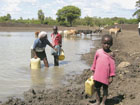| |  Environmental Health The health impacts of environmental conditions can be measured at the household, community, national, regional and global levels. The environment in which we live affects human health through a variety of distinct media, including air, water, and food. In addition, activities involving industrial production, transportation, and energy generation have the potential to affect health. The health impacts of environmental conditions can be measured at the household, community, national, regional and global levels. The environment in which we live affects human health through a variety of distinct media, including air, water, and food. In addition, activities involving industrial production, transportation, and energy generation have the potential to affect health.  Similarly, human transformations of the natural landscape through agriculture, construction, and infrastructure projects play an important role in shaping health outcomes. Working with the United States' technical and development agencies, with international organizations, and bilaterally, the Department of State uses diplomacy to promote activities ranging from household point-of-use water disinfection projects to mitigating the risk of airborne pollutants in cities and across international boundaries to improve global health. Similarly, human transformations of the natural landscape through agriculture, construction, and infrastructure projects play an important role in shaping health outcomes. Working with the United States' technical and development agencies, with international organizations, and bilaterally, the Department of State uses diplomacy to promote activities ranging from household point-of-use water disinfection projects to mitigating the risk of airborne pollutants in cities and across international boundaries to improve global health.
 The World Health Organization estimates that a significant percentage of global mortality can be attributed to environmental causes. For example, approximately 3.1% of all deaths-the vast majority of them occurring in children under the age of 5-are related to unsafe water, sanitation and hygiene. Urban air pollution accounts for 1.4% of all deaths, and problems related to exposure to indoor smoke, including respiratory infections, chronic pulmonary disease, lung cancer and asthma, cause considerable work and absenteeism, mostly in the developing world. The World Health Organization estimates that a significant percentage of global mortality can be attributed to environmental causes. For example, approximately 3.1% of all deaths-the vast majority of them occurring in children under the age of 5-are related to unsafe water, sanitation and hygiene. Urban air pollution accounts for 1.4% of all deaths, and problems related to exposure to indoor smoke, including respiratory infections, chronic pulmonary disease, lung cancer and asthma, cause considerable work and absenteeism, mostly in the developing world.  Action to remedy environmental health problems could have an important effect on countries' potential for economic growth. The Commission on Macroeconomics and Health estimates that addressing water and air related diseases could bolster economic development by enhancing labor productivity, improving educational opportunities, and enabling people to enjoy a longer period of income-generating productivity or creativity. Action to remedy environmental health problems could have an important effect on countries' potential for economic growth. The Commission on Macroeconomics and Health estimates that addressing water and air related diseases could bolster economic development by enhancing labor productivity, improving educational opportunities, and enabling people to enjoy a longer period of income-generating productivity or creativity.
 The State Department's Office of International Health and Biodefense (IHB) addresses the relationships among human health, environmental protection, and sustainable development as they intersect with U.S. foreign policy concerns. Working with other Department offices, with agencies across the U.S. Government, with international organizations, and with non-governmental organizations, IHB focuses on the diplomatic dimension of environmental health and sustainable development with respect to four broad themes: preventing and responding to the emergence of zoonotic diseases in international context; improving access to clean water and sanitation systems worldwide; promoting and strengthening the health component of the environmental cooperation agreements that form part of negotiated free trade agreements; and promoting attention to the health sector's service and response capacity within sustainable development programs. The State Department's Office of International Health and Biodefense (IHB) addresses the relationships among human health, environmental protection, and sustainable development as they intersect with U.S. foreign policy concerns. Working with other Department offices, with agencies across the U.S. Government, with international organizations, and with non-governmental organizations, IHB focuses on the diplomatic dimension of environmental health and sustainable development with respect to four broad themes: preventing and responding to the emergence of zoonotic diseases in international context; improving access to clean water and sanitation systems worldwide; promoting and strengthening the health component of the environmental cooperation agreements that form part of negotiated free trade agreements; and promoting attention to the health sector's service and response capacity within sustainable development programs.
Our partners:
| |
